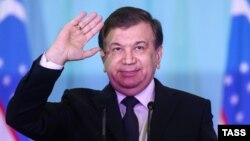Mirziyaev proposes direct elections of Uzbek regional, local leaders
| Publisher | Radio Free Europe/Radio Liberty |
| Publication Date | 8 December 2016 |
| Cite as | Radio Free Europe/Radio Liberty, Mirziyaev proposes direct elections of Uzbek regional, local leaders, 8 December 2016, available at: https://www.refworld.org/docid/5975a3173.html [accessed 21 May 2023] |
| Disclaimer | This is not a UNHCR publication. UNHCR is not responsible for, nor does it necessarily endorse, its content. Any views expressed are solely those of the author or publisher and do not necessarily reflect those of UNHCR, the United Nations or its Member States. |
December 08, 2016
 Uzbek President Shavkat Mirziyaev
Uzbek President Shavkat Mirziyaev
TASHKENT – Uzbek President-elect Shavkat Mirziyaev has proposed direct elections for regional governors and city mayors, part of what the first new leader the country has had in more than a quarter-century is portraying as a major push to make officials more accountable to citizens.
Speaking on December 7 at an event in Tashkent devoted to the 24th anniversary of the adoption of the Central Asian country's constitution, Mirziyaev said that "local officials will be more responsible if they are elected by the people."
Regional governors and city mayors in Uzbekistan have been appointed by the president since the country gained independence in the collapse of the Soviet Union in 1991.
"These days, local leaders are not talking to people, they are not solving people's problems," Mirziyaev said. He said that 2017 will be designated the Year of Dialogue with the People and Human Interests.
Mirziyaev, a longtime prime minister, was elected president on December 4 after three months as interim president following the death of Islam Karimov, who had ruled with an iron fist since 1989.
His government has released some people widely seen as political prisoners, made steps to improve ties with neighboring Central Asian countries, and established channels aimed to improve communication between citizens and the authorities.
Critics say such steps fall short of real reforms that could improve people's lives and provide them with basic human rights.
Link to original story on RFE/RL website
